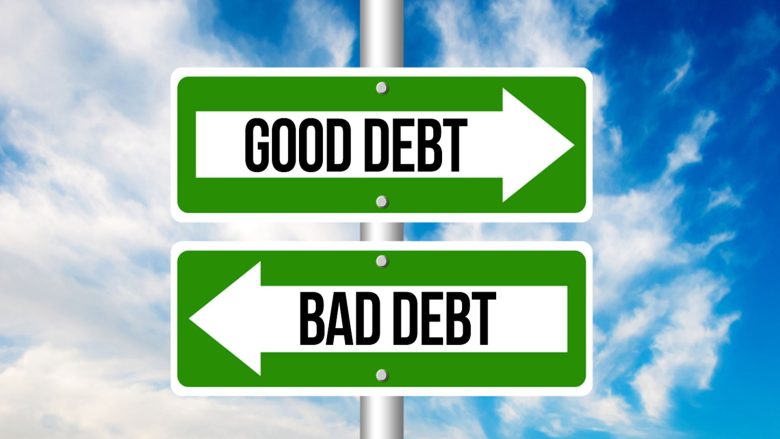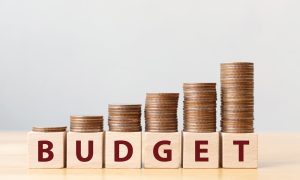Debt is borrowed money with the promise of repayment (usually with interest). Most people will encounter debt at some point in their lives, whether it’s a mortgage, student loans, credit cards, or personal loans. The word “debt” may sound ominous to those new to it, but not all debt is bad. Debt can help you achieve your financial goals or worsen your situation, depending on how you use and manage it. To distinguish beneficial debt from bad debt, remember that debt is a tool, and like any tool, its results depend on how you use it wisely.
The Concept of Good Debt
Positive debt is borrowed money that will benefit you in the future. It usually means you’re secured by assets that appreciate in value or generate interest over the long term. A home mortgage is an example of positive debt because property values typically increase over time, and owning property can help you build wealth. Student loans can also be considered positive debt if they help you pursue an education, leading to better job prospects and higher income. Positive debt typically carries a lower interest rate and is intended to help you maintain financial stability.
Understanding Bad Debt
Bad debt is borrowed money that doesn’t yield long-term benefits and is often expensive. Bad debt includes high-interest credit card balances, payday loans, and loans used to purchase items that quickly lose value. For example, if you use your credit card to buy expensive items or frequently dine out without paying off your balance, your debt will continue to grow and become pricier over time. Bad debt drains your resources, reduces your savings, and can make it harder to achieve financial security. Beginners can avoid difficult financial pitfalls by understanding what detrimental debt is.
Why Good Debt Works
Good debt can help people seize opportunities they otherwise wouldn’t have. Without student loans, many people wouldn’t be able to afford their education. Without a mortgage, most people still wouldn’t be able to buy a home. By taking on beneficial debt, people can move forward, improve their standard of living, and achieve financial stability. The key to positive debt is that the benefits outweigh the costs. When managed properly, it can help you achieve your goals and even improve your credit history, giving lenders the assurance that you can borrow responsibly.
How Bad Debt Causes Problems
Bad debt can cause stress about your financial problems and limit your future options. High-interest loans can quickly spiral out of control, making repayment more difficult. The consequence often means people can only make minimum payments, leading to mounting debt. Bad debt can also damage your credit score, making it harder to get loans for major purchases, such as starting a business or buying a home. People who take on debt for the first time can face numerous financial problems, and it can take years to recover from them. One of the most important ways to improve your financial situation is to stay debt-free.
The Key Difference Between Good and Bad Debt
The difference between good and bad debt lies in how it impacts your future. Good debt typically has a lower interest rate, which can benefit you in the long run and improve your life. On the other hand, undesirable debt typically has a high interest rate, which isn’t beneficial in the long run and can make saving or investing difficult. Effective debt can help you achieve your goals, while negative debt can hinder your progress. Beginners should understand how to distinguish between the two so they can make better borrowing choices and avoid mistakes that could harm their financial future.
The Emotional Side of Debt
Debt doesn’t just change the numbers in your bank account; it also changes how you feel and think. When handled properly, good debt can give you confidence and motivation by helping you achieve long-term goals and make progress. However, bad debt can cause worry, regret, and anxiety. Constantly worrying about bills or struggling to pay them off can damage your mental health. Understanding the emotional dimension of debt is crucial for people just starting out with it because it explains why making smart borrowing decisions is essential. Managing debt responsibly can help you feel better and experience less stress.
Planning for a Debt-Free Future
Some debt can be helpful, but the main goal should be to be debt-free. To plan for a debt-free future, you should use debt only when necessary and pay it off as quickly as possible. Beginners should try to pay off their negative debts first, then gradually pay off their beneficial debts while saving money. A debt-free future means more opportunities, freedom from financial problems, and peace of mind. Planning ahead can ensure debt serves its intended purpose and prevent it from becoming a lifelong struggle.
Conclusion
Beginners who want to make smart financial choices need to understand the difference between beneficial and undesirable debt. Poor debt can cause stress, drain resources, and slow financial progress. Positive debt, on the other hand, can help you grow, build wealth, and create new opportunities. Understanding how debt works, knowing how to manage it responsibly, and planning for the future are all steps toward financial well-being. If you know how to use it and develop beneficial habits, debt can be a useful tool, not a trap. The key is to recognize when guilt is helpful and when it is harmful and to make choices that lead to stability and independence.
FAQs
1. What is the main difference between negative and positive debt?
Positive debt can help you achieve financial growth and increase your value over time. Negative debt, on the other hand, offers no lasting benefits and often carries high interest rates.
2. Is all debt detrimental?
No, not all debt is detrimental. If managed properly, loans for education, housing, or other investments can be beneficial debt that can improve your future.
3. Why do many people consider credit card debt to be detrimental?
Credit card debt often has high interest rates, and if you don’t pay it off quickly, it can become unmanageable and really hurt you.
4. Is borrowing money a beneficial idea?
Yes, if you borrow within your means and develop a repayment strategy, good debt like a mortgage or student loan can work to your advantage.
5. What can beginners do to avoid bad debt?
Beginners can avoid bad debt by living within their means, avoiding high-interest loans, paying off credit cards in full, and only borrowing for essential needs.




